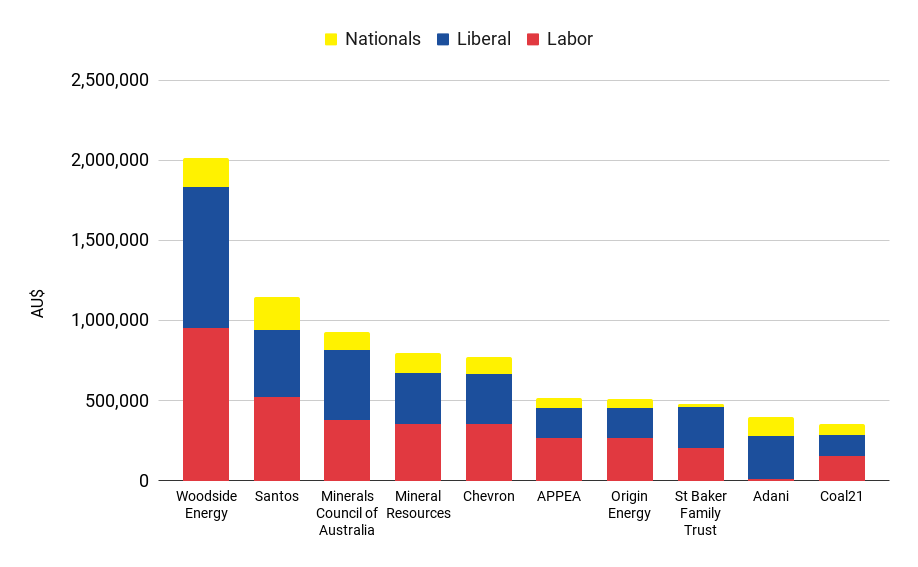1 February 2023
The Australian Government continues to support fossil fuel exploration and development in Australia, despite 2021 modelling by the International Energy Agency (IEA), confirmed again in late 2022, which finds that there can be no new coal, oil or gas projects if the world is to achieve zero net emissions by 2050 and limit global warming to 1.5°C.
Six new coal mining projects were approved between the release of the IEA’s report and the ousting of the former Liberal-National government, while the new Labor government has granted 10 new oil and gas exploration licences since. There are also 118 coal, oil and gas projects currently in the investment pipeline nationally according to the Department of Industry, Science and Resources. The Labor government is actively supporting these developments even while its own Climate Change Bill enshrines in law a 43% reduction in Australia’s emissions by 2030.
So why do all three major political parties continue to back the fossil fuel industry at the risk of catastrophic climate change? A trawl of the latest political donations data, released on 1 February, offers some clues.
Hefty donations from the fossil fuel industry
In FY2022 [1], fossil fuel companies donated $2 million to the ALP, Liberal and National parties.
Yet given Australia’s reputation for woefully inadequate political disclosure and ‘dark money’ donations, with 35% of all contributions coming from unknown sources, the true figure could be significantly higher.
Leading the pack with $188,000 worth of largesse was Mineral Resources, followed by INPEX with $157,300 and Santos with $153,660. Fossil fuel lobby groups like the Minerals Council of Australia and the Australian Petroleum Production & Exploration Association (APPEA) also donated nearly half a million dollars, with a combined total of $441,482.
Market Forces collates this data from the Australian Electoral Commission. Below you will find the full list of fossil fuel donors from the last financial year (note: the table is interactive and contains all fossil fuel donors from FY2015 to FY2022).
[1] Ending 30 June.
Political donations data FY2015-22
| wdt_ID | Number | Donor | Year | ALP | LIB | NAT | ALP+LIB+NAT |
|---|---|---|---|---|---|---|---|
| 1 | 1 | Adani | 2021-22 | 0 | 107,700 | 0 | 107,700 |
| 2 | 2 | Alinta | 2021-22 | 12,000 | 0 | 0 | 12,000 |
| 3 | 3 | Ampol | 2021-22 | 56,500 | 32,250 | 0 | 88,750 |
| 4 | 4 | APA | 2021-22 | 27,500 | 30,000 | 0 | 57,500 |
| 5 | 5 | APLNG | 2021-22 | 11,000 | 0 | 0 | 11,000 |
| 6 | 6 | APPEA | 2021-22 | 56,700 | 23,500 | 28,720 | 108,920 |
| 7 | 7 | Australian Pipelines & Gas Association | 2021-22 | 27,500 | 30,000 | 0 | 57,500 |
| 8 | 8 | BHP | 2021-22 | 0 | 16,704 | 0 | 16,704 |
| 9 | 9 | Cartwheel Resources | 2021-22 | 50,000 | 0 | 0 | 50,000 |
| 10 | 10 | Chevron | 2021-22 | 45,470 | 43,000 | 4,620 | 93,090 |
As the donation values disclosed by the donor and party often disagree, this table uses whichever value is larger in a given year.
Top 10 donors to the major political parties, total over FY2015-22

Help Market Forces keep publishing research that holds the fossil fuel industry and its enablers to account. Please join us as a monthly donor today:
Share this Post
Woodside continues to top the dirty donations league table
Over the period FY2015-22, Woodside blew the competition out of the water in terms of donations to the major political parties with a whopping $2 million in total – nearly twice as much as the runner-up. Given its huge expansion plans, it’s no wonder the company is trying so hard to butter up the major parties. Woodside is currently pursuing six new oil and gas projects in Australia and overseas, including the enormous and highly controversial Scarborough gas project. Scarborough is backed by the Federal Labor government despite its plans (now enshrined in law) to reduce Australia’s emissions by 43% by 2030.
Santos increases its donations ahead of controversial Narrabri Gas Project approvals
Santos comes in second place for its political donations over the last eight years and is no less controversial. Development of Santos’ highly polluting Barossa project in the Northern Territory has been halted since August 2022, with Australia’s Federal Court finding the company failed to consult sufficiently with Tiwi Islands Traditional Owners. Meanwhile, Santos continues to pursue numerous other new oil and gas projects that are incompatible with domestic and global climate goals. The company committed to develop a new oil field (Pikka, in Alaska) as recently as August 2022, and is currently working on expanding the scale of its plans for another new field (Dorado, in Western Australia).
Why is donations disclosure such a mess?
Unfortunately, one symptom of Australia’s poorly regulated political funding system is the huge discrepancies between what the major political parties disclose, and how much the fossil fuel companies claim to have gifted.
For example, in FY2022 oil and gas major Chevron disclosed $45,470 in donations to the ALP, whilst the ALP only disclosed $11,200 in donations from Chevron. Across all fossil fuel company donations to the three major parties, this resulted in a discrepancy of $1 million.
For ease of interpretation, our figures use the larger of the amounts disclosed (using the example above, it would be considered that Chevron donated $45,470 to the ALP in FY2022).
These discrepancies are just the tip of the iceberg. Australia’s political disclosure laws are incredibly lax, to the extent they were the subject of a damning report by the Grattan Institute and will be reviewed in the Senate Inquiry into the 2022 Federal Election. The Centre for Public Integrity estimates that more than $68 million in donations were of ‘unexplained origin’ in 2020-21, representing 38.6% of political parties’ income. The consequences of our pathetic legislation are many:
- Delayed reporting: learning about donations up to 18 months after they’re made
- Party and donor returns not reconciling
- Lack of standardisation of donor names
- Donations hidden in associated entities
- Donors can ‘split’ donations into small amounts that parties don’t have to disclose
